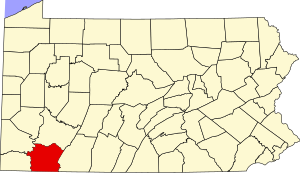






Please add profiles of those who were born, lived or died in Fayette County, Pennsylvania.
History
The first Europeans in Fayette County were explorers, who had used an ancient American Indian trail that bisected the county on their journey across the Appalachian Mountains. In 1754, when control of the area was still in dispute between France and Great Britain, 22-year-old George Washington fought against the French at the Battle of Jumonville Glen and Fort Necessity. British forces under Washington and General Edward Braddock improved roads throughout the region, making the future Fayette County an important supply route.
During the American Revolution, Fayette County was plagued by attacks from British-allied Indians and remained isolated as a frontier region. Also retarding settlement was a border dispute with Virginia; Virginia's District of West Augusta and Pennsylvania's Westmoreland County both claimed the area. In 1780 the dispute was settled by the federal government in favor of Pennsylvania, and Fayette County was formed from Westmoreland County in 1783.
Fayette County settlers provided the new United States government with an early test of authority in the 1793 Whiskey Rebellion, when farmers rebelled against tax collectors to protest a new liquor tax. President George Washington called out the militias to restore order. However, they were talked out of any violent action by owner of Friendship Hill and future Secretary of the Treasury, Albert Gallatin. Fayette County continued to be important to travelers in the early 1800s. The National Road provided a route through the mountains of the county for settlers heading west. The shipyards in Brownsville on the Monongahela River built ships for both the domestic and international trade.
As Pittsburgh developed its industries in the mid-19th century, Fayette County became a center of coal mining and coke production. From the 1880s to the early 1900s, the area's great expansion in steel production became nationally important, and labor unions shaped national policies. Both new European immigrants and African Americans in the Great Migration from the rural South were attracted to the Pittsburgh area for industrial jobs. The historic Scottish and German farming communities established in the earlier 19th century were soon overshadowed by the wave of immigrants from Southern and Eastern Europe. The region's wealth has been concentrated largely among the old English and Scottish families who had established businesses and political power in Pittsburgh prior to and in the advent of industrialization, often building the new manufacturing concerns, as did Andrew Carnegie. Bowman's Castle is well known for its connections to the Underground Railroad during the Civil War.
By World War II, Fayette County had a new unionized working class that enjoyed increased prosperity. In the 1950s, however, the coal industry fell into decline. In the 1970s, the restructuring and collapse of American steel resulted in a massive loss of industrial jobs and hard times in the area. The population has declined since the peak in 1940, as residents have had to move elsewhere for work. The loss of union jobs caused many working families to drop out of the middle class. Only a few mines are being worked in the 21st century, but natural resources remain crucial to the local economy. The region is slowly transitioning toward the service sector, with an increase in jobs in fields such as telemarketing.
In 1967 Uniontown was the birthplace of the McDonald's Big Mac sandwich.
Adjacent Counties
Cities & Boroughs
Other Communities & Townships: Acme, Adah, Allison, Arnold City, Bear Rocks, Buffington, Bullskin, Chalkhill, Collier, Deer Lake, East Uniontown, Edenborn, Fairbank, Fairhope, Farmington, Franklin, Gans, Georges, German, Grindstone, Henry Clay, Hiller, Hopwood, Jefferson, Lake Lynn, Leith-Hatfield, Lemont Furnace, Lower Tyrone, Luzerne, Lynnwood-Pricedale, McClellandtown, Melcroft, Menallen, Naomi, New Haven, New Salem, Nicholson, Normalville (formerly named Elm), North Union, Oliphant Furnace, Oliver, Perry, Redstone, Republic, Ronco, Rowes Run, Sagamore, Saltlick, Smock, South Union, South Uniontown, Springfield, Springhill, Star Junction, Stewart, Upper Tyrone, Washington, Wharton, Whitsett and Wickhaven
Links
Fallingwater a 1935 house designed by Frank Lloyd Wright
National Register of Historic Places
Ancestor Biographies of Fayette County
